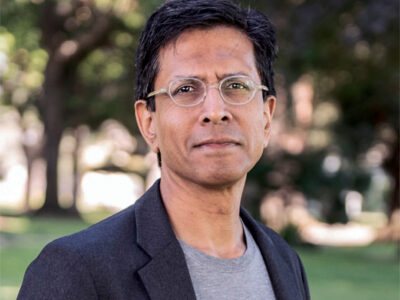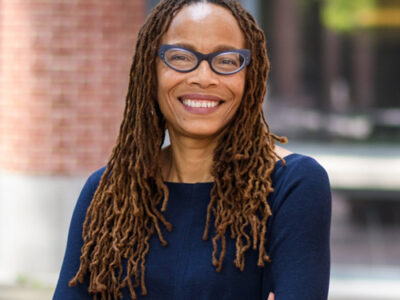Some 15 months after Dr. Rosemary Stevens stepped down as dean of the School of Arts and Sciences, the school finally got a permanent leader: Dr. Samuel Preston, the Frederick J. Warren Professor of Demography and director of the Population Studies Center who has been at Penn since 1979.
He replaces Dr. Walter Wales, the professor of physics
who had served as interim dean since Stevens’s resignation in September
1996.
In announcing the appointment of Preston, who took office last month, Dr. Judith Rodin, president
of the University, called him “the ideal person to lead SAS into the
21st century,” and added: “We are extraordinarily lucky that, having
scoured the nation to find a great new dean for SAS, the search
committee ultimately located right here at Penn the best candidate I can
imagine.”
Although he was reluctant to discuss it, Preston had actually
been approached about the post several times in the past, but had turned
it down. He cited “personal and organizational reasons” for his change
of heart: “Personally, I have been doing what feels like the same thing,
in a sense, for 30 years. This looked like an opportunity to do
something different — and important — for a while.” Furthermore,
having been a member of the SAS faculty for 19 years, he said: “I have
loyalty to the school.
I am very impressed with the faculty, the students, the leadership, and it was an opportunity to serve that unit that I feel is worthy of my efforts … I’m full of enthusiasm for the school and its programs. There are so many exciting things going on here, and there is a wonderful staff of associate deans and staff members.
“What the arts and sciences do is among the most important activities” on earth, he added. “We do fundamental research and we transmit the fruits of that research to new generations. Try to identify a human activity that is any more important than that. And because it’s so important, it’s essential that we manage the resources that we have to do it as efficiently as we possibly can. We’re going to be looking very, very carefully at everything that we do in the school to be sure it is contributing to the dual missions of education and research. And I promise that I am going to be extremely diligent in examining the logic of every dollar that we spend.”
The 54-year-old Preston has had, in his own words, a “fair dose of administration” over the years, including stints as chairman of the sociology department for two terms, director of the Population Studies Center for two terms, and graduate chair of demography. A member of the National Academy of Sciences, he served as chairman of its Committee on Population for four years and of the Social Political Science section for four years. Until he accepted the deanship of SAS, he had been serving as the University Council’s moderator and had headed the Faculty Senate’s committee on the economic status of the faculty.
Vivian Seltzer, the professor of human development and behavior who serves as head of the Faculty Senate, called him a “wonderful choice” to lead the school. “He’s a really good guy: very serious, thoughtful, deliberative — and flexible, which is a very important characteristic in a dean. And as is clear by his record of accomplishments and achievements, he gets the job done and he gets it done well. The quality and importance of his work is very highly regarded. He does not and would not deal in trivial matters. He goes into great depth in his study.”
A prolific scholar who has published a dozen books and more than 120 papers and reviews, Preston won the Population Association of America’s Irene B. Taeuber Award for Excellence in Demographic Research in 1983. Having earned his Ph.D. in economics from Princeton University in 1968, he acknowledges that he is “very comfortable with numbers,” which will stand him in good stead when dealing with the large and perennially tight budget at SAS.
“A demographer’s job is to generate and interpret numbers about populations and population change,” Preston notes. “I think that would give me a leg up on budget analysis, and certainly the budget and finance features of the deanship are important. The manner in which we allocate our resources and generate new resources is pretty vital to being able to move the school ahead.”
The school’s budget of approximately $220 million covers some 25 departments in a vast range of disciplines and a standing faculty of approximately 457. There were 498 standing-faculty members at the start of Stevens’s tenure in 1991, and some 540 at the school’s peak. “I think everyone agrees that the period of decline should end,” says Preston. “Certainly, my aspiration is to maintain the number of faculty members that we have. In a period of decline, of course, the faculty ages, and, disproportionately, the burden falls on junior faculty … So I think we need to revitalize the faculty with a very measured program of recruitment of assistant professors … I will sacrifice many other things before I sacrifice recruiting of faculty.”
Preston’s was not the only significant academic appointment over the last two months. Dr. Richard Beeman, professor of history, was named associate dean for undergraduate education and director of the College, succeeding Dr. Robert Rescorla, professor of psychology, who is returning to full-time teaching and research. And Dr. Michael Wachter, the William B. Johnson Professor of Law and Economics who had been serving as deputy provost, is now the interim provost, following the resignation of Dr. Stanley Chodorow, who is now a full-time professor of history.
Although the deanships are technically supposed to last for seven years, no one has actually stayed that long at SAS. Given that Stevens’s five-year tenure represented the longest so far, Preston said: “I hope and expect to stay for five years. My commitments are to Penn. I don’t see myself as having branched to an alternative career path of academic administration.”
Q&A with Dr. Samuel Preston
Gazette: Several years ago, a number of departments in SAS were
eliminated or forced to merge with other departments. Do you foresee
anything like that happening soon?
Preston: I don’t anticipate that happening. First of all, I don’t
think it’s an efficient way to downsize, because you still have tenured
members at those departments that you need to find homes for, and it
doesn’t save a lot of money. In the short term, what it does is make a
clear statement about priorities, and sometimes those statements are
important to make. So certainly I’m not saying that Rosemary Stevens was
wrong. I think she did some of the hard work already, and I don’t see
other departments that need to be closed on the basis of my review of
those departments.
One thing I want to experiment with is allowing departments to
manage their own affairs to a greater extent. Right now we give
departments pots of money: “Here’s a pot for graduate students, here’s a
pot for staff, here’s a pot for faculty.” What about letting
departments decide? As a former department chair, I could see ways of
spending the department’s resources that I thought would produce a
better teaching program and a better research program. But the manner in
which the budgets were being developed each year prevented that.
Gazette: Any other thoughts on how to deal with the monetary problems at SAS?
Preston: We have some major, major, major fundraising to do in
the school. We have structures that need to be replaced or revamped,
starting with the biology building, extending to the psychology
building. We’re going to have to undertake major campaigns to raise
money for better facilities for those two distinguished departments.
English and music have facilities that are not nearly adequate, and again, that’s going to be a priority.
What I think I can do as dean for the sciences mostly is help
them raise the funds that they need for the new structures that are
necessary.
Gazette: The plans for the psychology building are currently for the northwest corner of 34th and Chestnut?
Preston: Correct. That is the latest version of the plan, but
at this point not a single donor has been identified for that building,
so — I don’t want to sound a downbeat note, but it is also the case.
It’s going to be much harder, apparently, to find money for psychology
than it is for the biology building. I’m not sure why that is, because
there is so much fascinating research going on in this field right now,
and we have one of the best departments in the world.
In some ways I think it’s more fun to raise money for buildings
than it is for endowment. Because you get to spend the building money
right away, and the endowment money you spend at a [4.7] percent clip.
Gazette: Any thoughts on how you’re going to beef up the school’s rather low endowment?
Preston: I don’t have anything to say beyond: I wish to God that we had more and that I’ll work very hard to generate it. We’re not as well endowed as many of our peers, and we are going to work hard to correct that. The fact that the stock market has done as well as it has over the past three years means that we’ve got a sudden increase in endowment. I think that’s very positive, but it’s also the case that we’ve never worked on building it up through contributions.
We also need to raise endowment for student aid. Apparently about 10 percent of Penn’s student-aid budget comes from endowment, and that figure has got to be raised … So we’re going to be extremely active in trying to do that.
Gazette: What else?
Preston: One of the major roles a dean has to perform is to
continuously emphasize the importance of undergraduate education. It is
the principal source of income for the school. And it is essential that
we do the best possible job that we can with undergraduates. I think we
do a very good job, but it’s also the case that we’ve got to
continuously rethink our undergraduate programs to be sure that we’re
taking advantage, for example, of the latest advances in technology. I
mean, technology is changing the nature of what goes on in a course.
I think we have too many large undergraduate classes. I think
there are students here who don’t get into classes smaller than 40 or 50
until they are juniors. In some cases that’s a matter of reducing the
number of very large classes and reducing the number of very small
classes and trying to move departments to having more moderate-size
classes where there’s really more a sense of interaction between the
teacher and the students. I think the faculty is very willing to do
that, but it’s a matter of working with each department to try to see
what they get there.
One initiative that was just taken in the fall — and I’m very
enthusiastic about it — is the imposition of a quantitative-reasoning
requirement in the school. I believe it takes effect next year. I think
in this world where science and technology is so important and where
quantitative teachers are so prominent in the workplace and in the world
at large, we’re remiss if we don’t ensure that students have had some
basic exposure to quantitative reasoning in the classroom. But when
you’re proposing a requirement of this nature, you’ve got to be sure
that you’ve got the courses, and at this point it looks to me like it’s
going to be a tough stretch. So that’s going to orient some of the
faculty recruitment over the next several years.
Gazette: Any thoughts on graduate students?
Preston: Our numbers are down from where they were but they’ve leveled off. We’re basically trying to get fewer graduate students so that they get through the programs faster and we get a better draw amongst the applicants. And I believe the evidence is that this program is working.
When I came to Penn 20 years ago, the thing that most distinguished us from the universities that we like to compare ourselves to — the Harvards and Yales — was the degree of support for graduate education. There virtually wasn’t any, apart from TA-ships. There is now a very solid fellowship program in place. We are getting a better
group of graduate students — albeit relatively small, by design, so that some of the graduate courses that we used to teach are not being taught now, and we’ve moved more of the faculty into undergraduate teaching. That’s not easy to manage at a department level, but it has been managed effectively and we are going to keep trying to do that — because again, undergraduate education is buttering the bread, and we’ve got to be sure that we are doing an outstanding job there.
There are absolutely brilliant people in field after field that are eligible to be hired, and Penn does about as good of a job of recruiting people as any school in the country. You know, we have a real advantage over Harvard and Yale in that we put people on tenure-track with a reasonable probability of being promoted. So most assistant professors, given a choice, would prefer to come to Penn rather than Harvard. And I think that it’s important that we mount a series of searches in different disciplines that succeed in bringing us a bigger flow of young talent than we have recently received.




